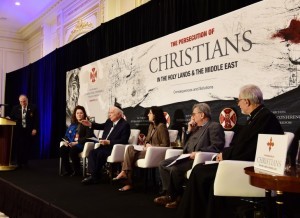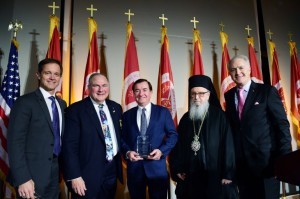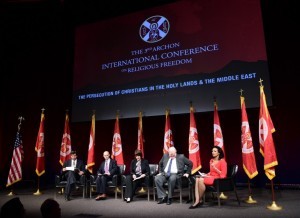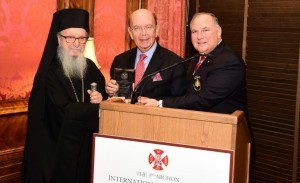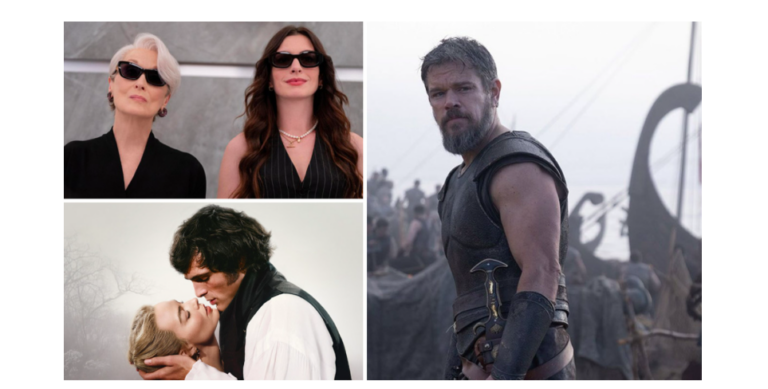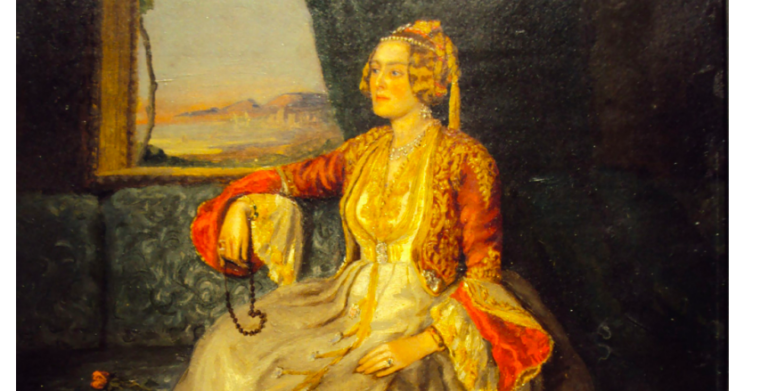Members of the U.S. Congress, religious leaders and academics who gathered in Washington for a three-day conference that was held from December 4 – 6, made a strong call to the Trump administration and to the World that measures should be taken to end the persecution of the Christians in the Middle East.
The conference on the “Persecution of Christians in the Holy Lands and the Middle East: Consequences and Solutions” was sponsored by the Order of St. Andrew, Archons of the Ecumenical Patriarchate.
Violence arising from religious intolerance is a huge global problem,” U.S. Secretary of Commerce Wilbur Ross pointed out at the opening session of the Conference.
“The truth is that freedom of thought and belief are the underpinning of the most innovative and vibrant economies in human history – the United States among them,” Ross said. “That is at least partially why it is troubling to see a resurgence in the persecution of Christians in recent years.”
Speaking about the conference, His Eminence Archbishop Demetrios of America remarked, ”This conference provides the context for intensifying our prayers to God for the safety and well being of all Christians confronted by forces of hatred, religious intolerance and wild fanaticism.”
“There’s no bigger atrocity than killing in the name of religion”, said Archbishop Demetrios.
“All Christian brothers and sisters in the Middle East are facing dire consequences due to the constant upheavals and disastrous war-making that have afflicted the region for a season of intolerable length”, said in his video message the Ecumenical Patriarch Bartholomew.
Citing the joint message with Pope Francis in 2014, he said the two of them encouraged all parties regardless of their religious convictions to continue to work for reconciliation and for the just recognition of peoples’ rights.
“We are persuaded that it is not arms, but dialogue, pardon and reconciliation that are the only possible means to achieve peace”, their message was stating.
Bartholomew underlined that the Ecumenical Patriarchate, living as both an ethnic and a religious minority for half a millennium, is well aware of the complexities and challenges that all Christians of the Middle East are facing.
“The dissolution of regimes, the Western-back policies of regime change, the still intractable situation of Palestinian autonomy and the nation of Israel, the struggle within Islam over its own orthodoxy and confrontation with modernity – all of these are issues and subjects well known at the Phanar”, he said.
“Christianity is being wiped out from the very lands in which it was born 2,000 years ago,” said Dr. Anthony Limberakis, National Commander for the Order of St. Andrew. “By hosting the Third International Conference on Religious Freedom, the Order of St. Andrew aims to shed light on this crisis confronting Christians in the Middle East. Our discussions are to bring the light of truth and expose the darkness.”
An unfortunate fact of the Conference is that no mention was made on the destruction of Greek Orthodox religious sites in the occupied areas of Cyprus, an issue that U.S. Congress has often raised.
MEMBERS OF CONGRESS
Senators and Congressmen who spoke Tuesday at the Third International Conference on Religious Freedom stressed the need for the U.S. government to take a more vigorously active role in protecting endangered Christians in the Holy Lands and the Middle East.
These members were: The Chairman of the House Global Human Rights Subcommittee and Co-Chairman of the Helsinki Commission, Congressman Chris Smith, (R-NJ); The Co-Chair of the Congressional Caucus on Religious Minorities of the Middle East and representative of America’s largest Yazidi community, Congressman Jeff Fortenberry, (R-NE); Senate Foreign Relations Committee Ranking Member and former Chairman of the Helsinki Commission, Senator Ben Cardin, (D-MD); leading advocate for American pastor Andrew Brunson unjustly imprisoned in Turkey, Senator James Lankford, (R-OK); Co-Vice-Chair of the Congressional Religious Freedom Caucus and Archon, Congressman Gus Bilirakis, (R-FL); and Co-Chair of the Congressional Hellenic Caucus Congresswoman Carolyn Maloney, (D-NY); The sessions were held in the U.S. Senate Caucus Room and Capitol Visitor Center Auditorium.
The chairman of the House Foreign Affairs Committee Ed Royce who also addressed the Conference was honored by the Archons for his efforts to promote religious freedom and human rights around the Globe.
“More than ever before, vigorous U.S. leadership and diplomacy are needed to address religious freedom violations in the region (Middle East and Holy Lands) and globally,” Rep. Smith said in his address.
He also urged “enhanced religious freedom training for the Foreign Service including ambassadors and integrating religious freedom into every aspect of U.S. foreign policy.”
Smith recommended a timely designation of a “country of particular concern” as well as designation of an “entity of concern,” such as a terrorist group. He also urged the meting out of sanctions on designated countries and holding not just countries but also individuals accountable.
Rep. Maloney emphasized that religious persecution “is happening all over the world,” adding that there is a need to create a system to accurately track everything happening to Christian minorities and other religions.
“We need to put more meat in legislation,” she added, such as no aid to Egypt unless they let Christians rebuild their churches.
Maloney has advocated for reform in Turkey such as the reopening of Halki – the Greek Orthodox Christian theological school the Turkish government closed in 1971.
“Look at countries that respect minorities, religion and women – they don’t have terrorism,” Maloney added.
Rep. Biilirakis emphasized the need to “speak out. Our darkest moments have come when those who know better stood still. We must fight to protect Christians all over the world.”
He said the United States must “stand up” to our so-called allies, recommending this country appoint an ambassador-at-large for international religion freedom.
Rep. Fortenberry said that attacks on Christians are not only a loss of life, but are a disabling factor in the Middle East.
“What has happened is genocide,” he emphasized. “What needs to be done is resurrection, revitalization and repatriation”
Sen. Cardin stressed the need to protect religious targets because “what we see in the Middle East is unacceptable. If we don’t take any action, we condone that activity. The United States must take the leadership. Those committing atrocities should not get a pass.”
The senator pledged his commitment to protect Christian minorities in the Middle East and elsewhere. “You have my word,” he said.
Sen. Lankford urged that we speak out clearly for those who are unjustly attacked.
“More and more places in the world have less freedom,” he noted. “Blasphemy laws are being adopted in the world. We should not freely trade with a country that doesn’t recognize religious liberty.”
While emphasizing that there is much work to be done, the senator also urged that we “don’t lose hope.”
The members of Congress were not the only participants to urge work on behalf of embattled Christians worldwide.
Senator Marco Rubio described the Middle East as “ground zero” for attacks against Christians.
“Yet, it is a testament to the unbreakable ties that Christianity has to the Middle East – and to the unshakeable faith of our brothers and sisters – that they persevere in this region despite this. But the Middle East is more than where Christians live. It also at the center of our narrative as it’s set forth in the Holy Scriptures.”
Senator Rubio stressed that U.S. foreign policy should be infused with our most deeply held values, such as these. Not to impose it on other people but to ensure that in everything we do, we protect the rights of others to also fulfill their God-given rights.
“The right of the ability of every man, woman and child to peacefully worship and live out their faith according to the dictates of their conscience is at the heart of human dignity, and should animate us both here and abroad. Violations of religious freedom occur daily around the globe at the hands of state and non-state actors alike. No faith and no region is untouched. But the focus today is on the persecution of Christians – which has reached staggering levels. That is our focus.”
RELIGIOUS LEADERS
Rabbi Arthur Schneier, President and Founder of the Appeal of Conscience Foundation described mutual respect and acceptance as the ultimate goal, with first and second steps the dialogue and the collective action.
Archbishop Angaelos of London of the Coptic Orthodox Church in UK address the crimes against Christians in Egypt, stressed the need for a collaborative response that brings together policy makers, religious leaders, and civic society, bringing all of our abilities together, all that God gives us, to represent them.”
Archbishop Angaelos has also sent a message to the perpetrators.
“Recently some of you may have heard that I issued a statement after our own brothers and sisters in Egypt were brutally shot. It was a message to the perpetrators saying, ‘You are loved. Your actions are abhorrent and detestable, but you are loved by my God, and by me, and by millions like me, because you have the same nature, image, and likeness as me.’ We pray that God, Who speaks to their hearts, brings them to a place where their eyes are opened and they see the sanctity of life, and turn away from seeing other humans as mere commodities.”
Also at the press conference was Archbishop Dionysius John Kawak, Archbishop and Patriarchal Vicar, Syriac Orthodox Archdiocese of the Eastern United States, who stressed the importance to find a solution, noting that 50 percent of the Syrian Christians have left that country.
“Our goal as Middle East Christians is to teach everyone to accept one another,” he said, emphasizing the need to stop the war, adding that we must “collaborate to help those that need the most help.”
Those who spoke on the same panel included, Johny Messo, president of the World Council of Arameans (Syriacs), Anna Koulouris, Communications Advisor, Patriarchate of Jerusalem, and the Very Reverend Fr. Isaac Crow, Antiochian Orthodox Church.
ACADEMICS
“20% of the global Christian population lives in countries where they are subject to severe persecution”, said Dr. Timothy Samuel Shah, Religious Freedom Institute Senior Director.
Also participating at the press conference was Elizabeth Prodromou, Tufts University Fletcher School for Law and Diplomacy visiting professor of conflict resolution, saying what happens in the Middle East is important because all people have the right to be free, stressing that Christians are being targeted.
Professor Prodromou said often times we tend to look for external signs of distraction and elimination. But property rights are one of the most pernicious ways of persecution.”
“Destruction of sacred sites is a form of Memorycide. It kills the memory of people on a site”, she added.
David Curry, CEO of Open Doors USA, a California-based non-profit that has tracked Christian persecution for the past 25 years, spoke about the upcoming World Watch List of the organization that is coming out in January.
“This resource identifies which countries participate in the worst persecution of Christians”.
Curry said the list is driven not just by voices in leadership, but from the everyday believer undergoing trials because of their faith.
“I think both approaches are terribly important—that we have senators and congressmen meeting with church officials to hear the stories of what’s happening in their regions. I think it’s good.” But, he says, “It can’t do everything. We need to continue to draw attention to what’s happening at the grassroots level and talk about it in the halls of congress– pray about it in churches.
Curry explained that when people start to get away with persecuting Christians, things begin to unravel quickly. Soon, other parts of society become targets of abuse. The entire population suffers because of religious persecution.
“This is the issue we need to be talking about and addressing. And I think when people don’t have the freedom to worship the way they choose, they basically don’t have any freedom at all.”
Source: greeknewsonline.com
Ask me anything
Explore related questions
